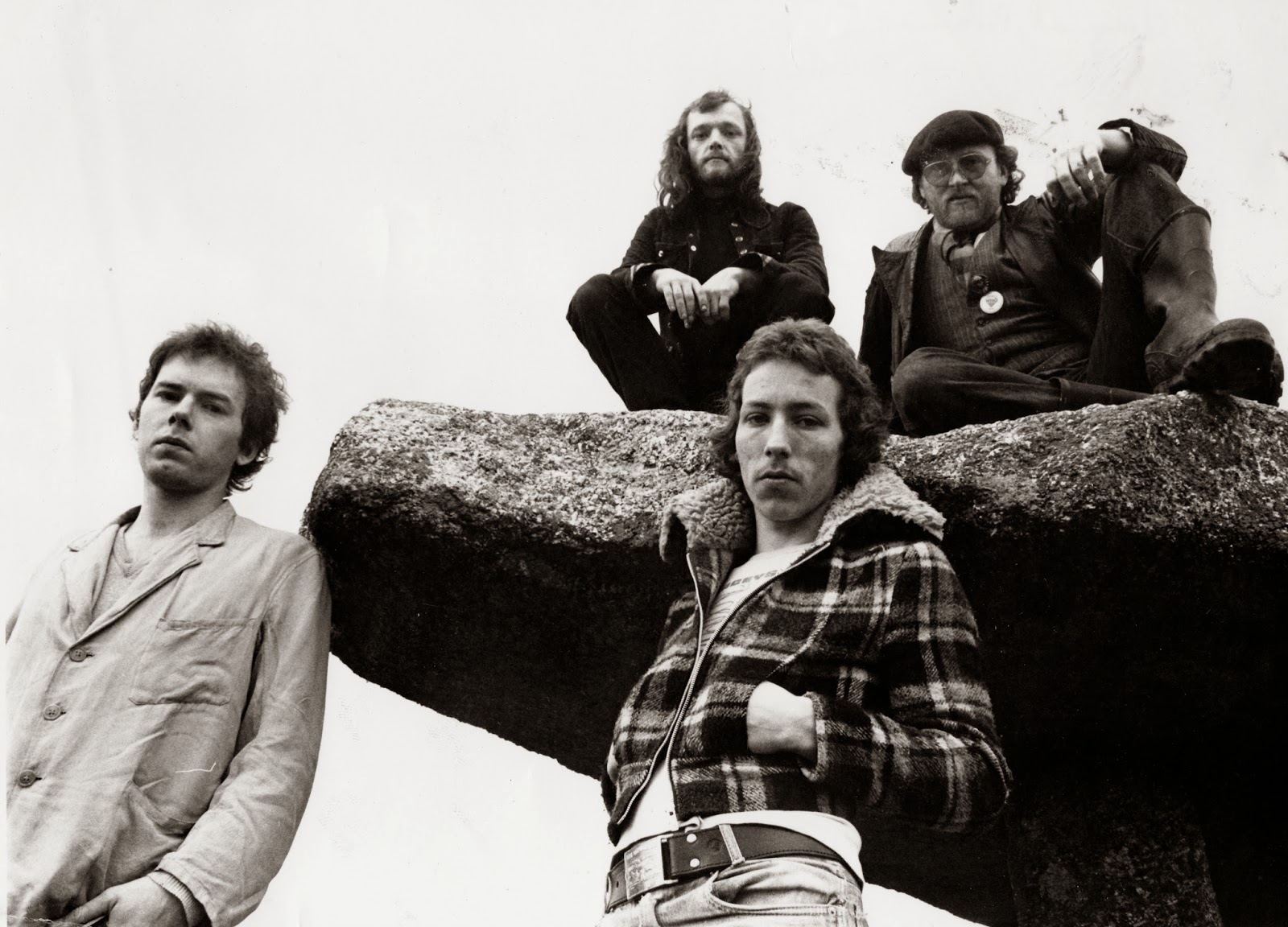Brainiac 5 | Interview
Formed out of the ashes of free festival favourites The Half Human Band – also featuring Griffin – the initial Brainiac 5 line-up of guitarist/vocalists Charles Taylor (aka Charlie Nothing) and Bert Biscoe, bassist John ‘Woody’ Wood and drummer Steve Hudson made a name for themselves on the isolated yet thriving Cornish pub, club and festival scene.
Coming to the attention of the New Musical Express with their ‘Mushy Doubt’ EP, and with Richard Booth of early Stiff signings Plummet Airlines replacing Biscoe, the band made the move to London to enjoy the fruits of a gig circuit enlivened by punk. However, they split before ‘World Inside’ could be released, the album eventually seeing the light of day in 1988 via Reckless Records, the label arm of the secondhand record empire founded by Taylor, also responsible for releases by such psych legends as Bevis Frond, Black Sun Ensemble and Mu. Fast forward to 2013 and with Taylor returning to the UK after 20 years running Reckless stores in the States, the opportunity to reconvene the Brainiacs results in ‘Space Is The Place,’ a 10-inch EP of new recordings on Bucketfull Of Brains magazine founder Nigel Cross’s Shagrat label. Garnering effusive reviews from the likes of The Wire and Shindig! magazines, and with Charlie and Woody now joined by another Plummet alumnus Duncan Kerr on guitar, along with Nick Onley on sax and flute and Wayne Worrell on drums, Brainiac 5 are once again very much a going concern. A long strange trip indeed!
“As time went by became more and more psychedelic and free form”
Who were the original members of the band and how did you all meet?
Colin Hill: By 1976 three of the original members, John “Woody” Wood, Charlie Taylor, and Steve Hudson had made the move westward to Cornwall and had begun hanging out with local musicians, including agitprop poet Bert Biscoe. Woody was the first to arrive. In his youth he worked as doorman at the legendary Crawdaddy Club in Richmond, London (occasionally sitting in with bands on harmonica), and shared flats with Eric Clapton and Guy Stevens. After a spell in Canada, he settled in Penzance and worked as a structural engineer, becoming a music and arts promoter at weekends. Initially he took over The Mermaid Folk Club at The Gurnard’s Head Hotel in Zennor and then set-up Jacey’s Blues Bar in the sail loft of The London Inn in Penzance with Sundays being set aside for “Jazz, weirdness and poetry”. Charlie Taylor (aka Charlie Nothing) from 1971 to 1973 had played a pear-shaped Vox in the legendary, guitar-based, very loose and very hairy Half Human Band, regulars on the “free festival” scene including appearances at Windsor and Trentishoe. Although his version of the band was never recorded, a couple of their songs were later resurrected by the Brainiacs. After starting out on bass, Steve Hudson (who was a huge fan of The Legion of Superheroes) decided to follow in his brother Al’s footsteps and took up the drums. When Al moved out of London to play with some of the more professional Cornish bands, Steve ended up in Penzance too. Bert Biscoe was the only native Cornishman in the band. He had been active as a song-writer, poet and radical thinker, (including ‘Brengun’ a 42 page epic poem), performing in folk clubs and at festivals and doing support gigs at university in North Wales. All four were keen to experiment musically and given their thirst for the obscure and arcane it was inevitable that, in such a relatively small community, their paths would lead them to Jacey’s Blues Bar, where they formed a new band comprising Bert, Charlie, Steve (aka Heartbeat) and Woody, which sprang spontaneously from a jam in a Pendeen garage. Initially named Roadmaster (possibly after the Gene Clark album?), at Steve’s suggestion they eventually settled on … The Brainiac Five!
John “Woody” Wood: Initially this jam was set up to record some of Bert’s songs that he wanted to put on cassettes to give as Christmas presents. These songs came from when he was living at my place. He would get up early every morning, go and buy newspapers, then randomly pick headlines and write a song based on that. I would get up, and before I could even make a cup of tea, he would be hustling me to work with him on this stuff. There was always a lot of it, and sometimes there would be some real gems buried amongst it all.
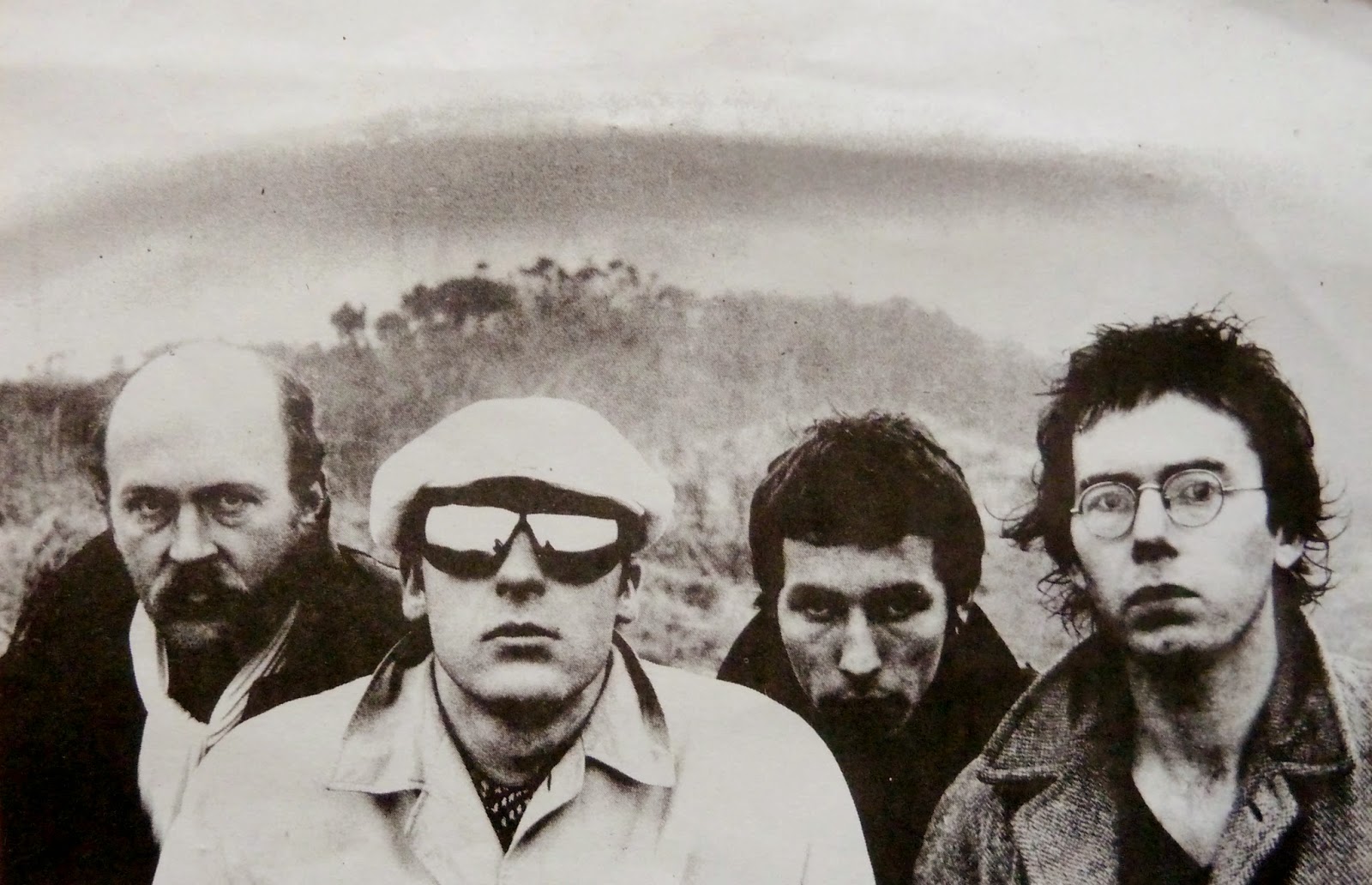
You went from a more punkish style towards psychedelia, but never left the punk behind and in 1978 the two genres met in your EP ‘Mushy Doubt,’ which was produced by Martin Griffin (drummer of Hawkwind from 1980-83). Roach Records released this EP. What’s the story behind making this EP and what can you tell us about the songwriting process?
Charlie Taylor: Martin ran a recording studio in the mid-Cornwall village of Roche. He kindly offered the band free studio time when no one else was booked in, and also made active contributions as producer, engineer and honorary fifth Brainiac. Our first release, the ‘Mushy Doubt’ EP, came out on Roach Records with the label design being a cross-section of rolled card torn from a cigarette packet. The songs were written by me, except for ‘Endless River,’ which was written by Bert and me. My habit was to write songs first thing in the morning, while still half asleep. In that way the songs more or less wrote themselves without active participation from my conscious mind (I was reading a lot of mystical literature at the time). I was a big fan of Quicksilver Messenger Service, Moby Grape and the like, but the Velvet Underground were also a huge influence, especially ‘Sister Ray’.
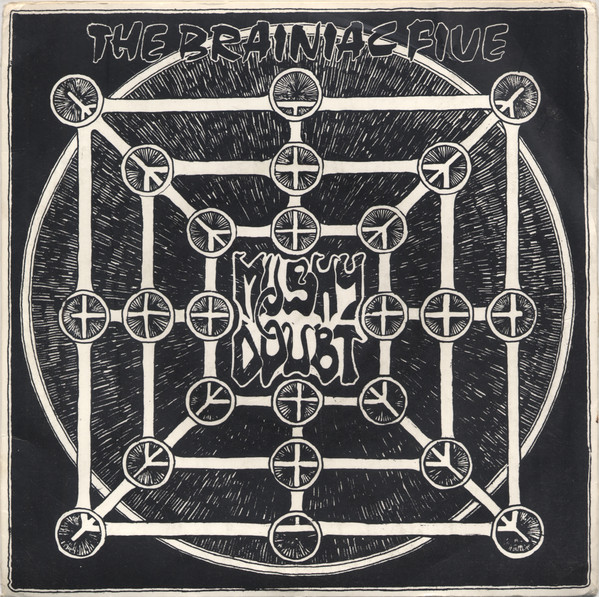
John “Woody” Wood:: The recording was done on 4-track, live, with only minor overdubbing. We didn’t even stop between numbers, just kept going until the end.
Can anyone tell us about the Half Human Band?
Charlie Taylor: The group was formed In Oxford in 1970. The early lineup was Charlie Taylor, “Hairy” Mart Isaacs (slide guitar and vocals), Dave Pugh (bass) and Martin Griffin (drums, and later Hawkwind member and Brainiac 5 producer). We played around the Oxford area and at various free festivals, including Windsor with the Pink Fairies. We started out playing a fair amount of blues, but as time went by became more and more psychedelic and free form, featuring lengthy improvs from guest saxophonist Pete McPhail and poet Crazy George. Recordings were made but subsequently lost.
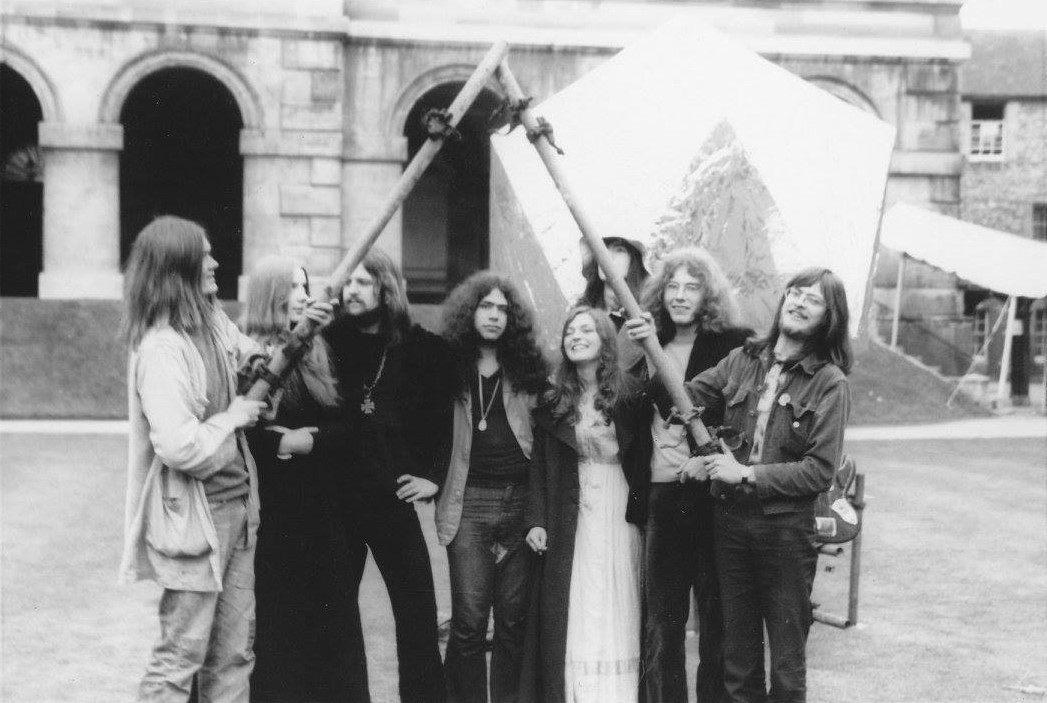
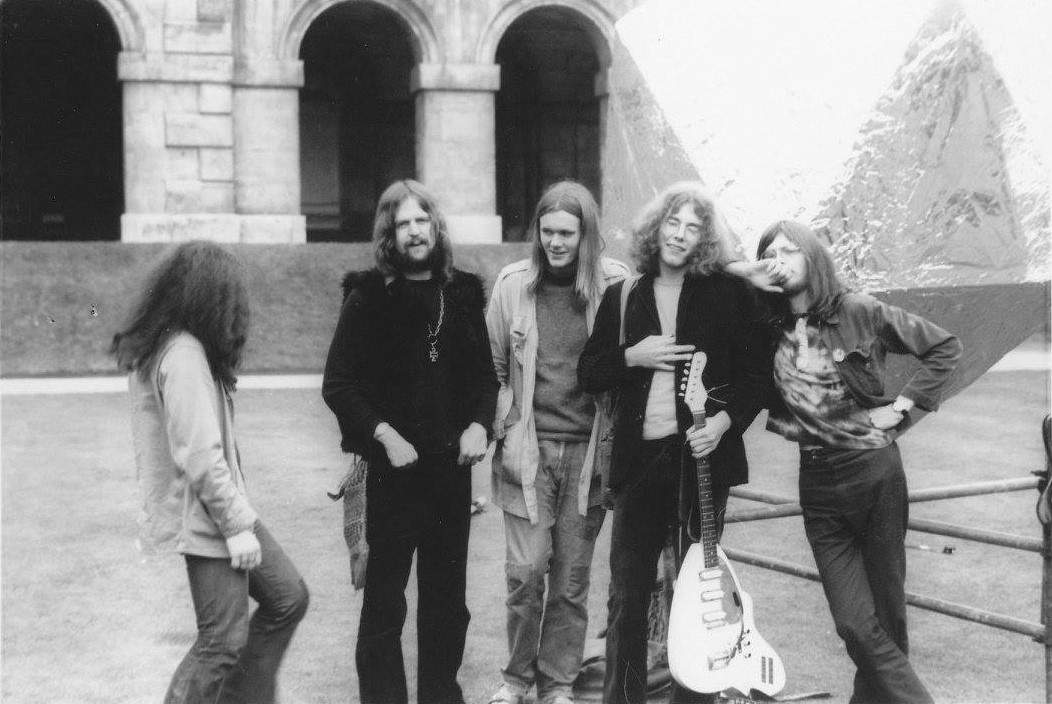
After the EP was out you had some lineup changes and later you moved to London, where the punk scene was beginning to fade.
Colin Hill: Bert’s last Brainiac gig until 2012 was a benefit in September 1978 for the (now French-based, world-famous) Footsbarn Theatre Company in a marquee on the edge of Bodmin Moor. Enter Richard “Wildman” Booth (lead guitar/vocal). Richard had played twin-lead guitar with Duncan Kerr in Plummet Airlines, a terrific west-coast influenced band from Nottingham who’d made waves on the London pub-rock circuit in the mid-70s, recorded two John Peel sessions, backed-up ex-Help Yourself songwriter Malcolm Morley on a solo LP and were one of the first bands to issue a 45 on Stiff Records. With the arrival of “Wildman” and his custom-made parallelogram-shaped mahogany-bodied guitar the classic version of the Brainiacs was now complete. Richard had added a dazzling lead break to the jagged ‘Monkeys & Degenerates’ which made it the only true Brainiac Five recording.
Charlie Taylor: Bert left and Richard joined while we were still in Cornwall. This version of the band played dozens of gigs and became very tight. We had a weekly residency at Jacey’s and played in pubs and colleges all over Cornwall, and also at well-paying tourist resort gigs where cover versions were required (‘Black Magic Woman’ by Fleetwood Mac, ‘Cosmic Watch’ by The Sadistic Mika Band, ‘Down Down’ by Status Quo, ‘Rock ’n’ Roll’ by (ahem) Gary Glitter, ‘Something Else’ by Eddie Cochran, ‘Do Ya’ by the Move, ‘Hey Joe’ et cetera). We recorded our LP ‘The World Inside’ at Roche and moved up to London to try to get it released by a reasonably sized record label, but that didn’t work out.
You were active when psychedelia was really obscure and unpopular. Just in between the end of Golden Era of Psychedelia and before Paisley Underground and all the Neo-Psych scene. Where do you think your sound originated?
Charlie Taylor: From a combination of listening to the S.F. psychedelic bands of the ‘60s and absorbing the very laid-back atmosphere of West Cornwall at the time. The Summer of Love was still continuing down there ten years after it finished elsewhere.
What would you say were some of the influences?
Charlie Taylor: Captain Beefheart, Spirit, MC5, Sun Ra, Quicksilver, Sex Pistols, Television, CAN, early Blue Oyster Cult, Grateful Dead, Amon Duul II, Cluster, Love, Family, Henry Cow, Soft Machine, Caravan, Byrds, Fairport Convention, Traffic, Groundhogs, Hawkwind, Stooges, Little Feat, Tower Of Power, Miles Davis 1969-1975, Moby Grape, The Move, Pink Fairies, Pretty Things, Ramones, Status Quo, Velvet Underground, Wire, XTC and more….
How well were you involved with the local scene and what were some other bands at the time that sounded similar or were part of a similar scene to you?
Woody: Many local bands were featured at Jacey’s. We encouraged kids from the local school to form bands, even if they could only play a couple of numbers. Some of these, like The Vendettas, went on to become very good punk bands. One of these, Septic and The Sceptics, at some point changed their name to The Newlyn Male Voice Choir which caused all sorts of confusion for some of the audience that turned up. We also got some of the bands that were just playing covers on the circuit to sort out some more interesting stuff to come and play. There wasn’t much in the way of psychedelia from anyone else. The nearest thing to us musically were The Fans and Missing Chemicals who were from Exeter. They came to Jacey’s and we went up there to do things with them. Later, Bert formed a band called Lip Service which started out fairly punky but became more pop-orientated after he left. The audience at Jacey’s was a good mix of old hippies and young kids which was great. This mix seems to have gone from gigs a lot now with the audiences really polarized. It would be nice to be playing to more young people now – I am sure that they would get it!
What happened next after the EP was out? We know you recorded another single ‘Working’ / ‘Feel’ and you used a cover from legendary Max Ernst, who was part of Zurich’s Dada movement. Why is that?
Charlie Taylor: We released the ‘Working’ / ‘Feel’ 45 in January 1980, this time on Roche (as opposed to Roach) Records. The cover design was borrowed from the 1933 collage ‘Une semaine de bonté’ (a week of kindness) by Max Ernst, the German Dada-ist, and the image of the falling (or levitating) woman was used for our early promotional material and continues to appear on Brainiac posters to this day. There’s no specific reason – we just liked the surreal feeling of freedom evoked by the image, which we hoped was reflected in our music.
What would you say was the main concept behind your band?
Charlie Taylor: We try to be uplifting, realistic and intense.
Do you have any crazy stories that happened while playing live?
Woody: The incident that I really liked was not connected to The Brainiac 5 but to Jacey’s. I had booked a band called Edna Paper Bag (a real group of reprobates). They turned up on stage with their heads in paper bags (Edna paper bag, I know I know). They also had a big sign saying that they were “The Average Woody Band.” When they took the bags off their heads they had swimming caps on, making themselves look bald, and wire frame glasses. (I am bald with wire frame glasses). As I looked more I thought “I have got a coat just like that”. Then it dawned on me they were all wearing my clothes! They had been to my place and pinched them. The guitarist was pretending to play this vacuum cleaner thing with strings on it like a guitar. When he switched it on, its motor had been reversed so it blew, not sucked (when it blows it sucks, I am sure I have heard that lyric somewhere?). Its bag was full of feathers which shot out all over the place. I got hell from the landlord about the mess.
What happened in the ’80s?
Charlie Taylor: In 1979 we moved to London and played at venues like The Rock Garden, The Hope & Anchor, The Moonlight Club, Dingwalls and The Kensington. Difficulties getting a record deal, on-going cash-flow problems and the lack of time and resources to develop and rehearse our music in London all conspired against us. We gradually ran out of enthusiasm and sometime towards the end of 1980 we mutually agreed to end the band and go our separate ways.
There was a ‘Reptile Woman’ single in 1983 and ‘Tim’ / Monkeys & Degenerates,’ a few years later an album was released, which was recorded a few years earlier titled ‘World Inside’. Why did it take so long?
Charlie Taylor: ‘Reptile Woman’ wasn’t us – at least I don’t think so! ‘Time’ was an out-take from the World Inside sessions. ‘Monkeys & Degenerates’ was an early recording with Bert on vocals. These two tracks were released in 1986 by a German label called Roadrunner Records.
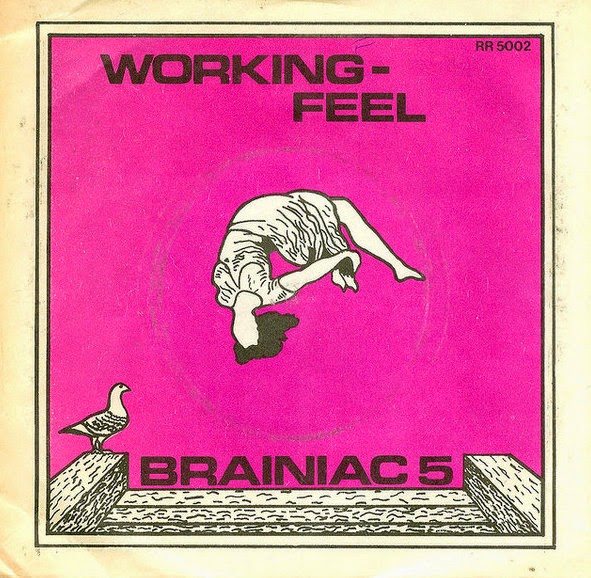
‘World Inside’ was recorded at Roche in 1979. It consisted of many of the tracks we were playing live. Unfortunately we didn’t secure an acceptable deal for its release at the time. Charlie went on to start the Reckless Records chain of record shops and when that was doing well decided to start a record label, also called Reckless Records. The Brainiac 5 LP was a natural first release in 1988.
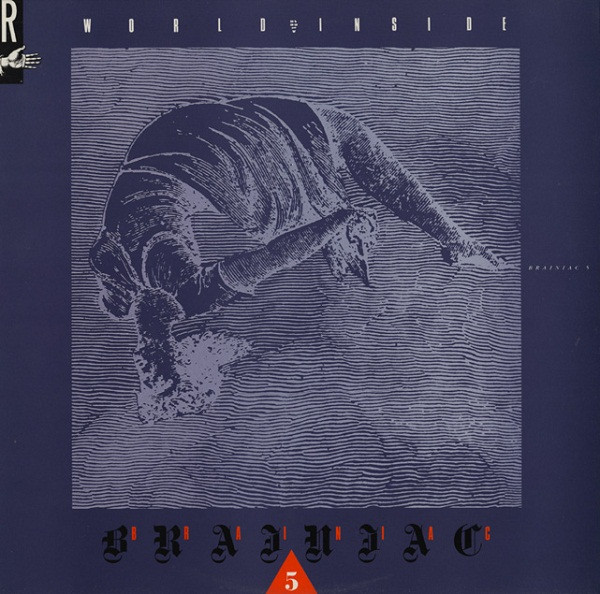
The label had some interesting artists like The Bevis Frond, Black Sun Ensemble et cetera.
Colin Hill: the Reckless discography consists of 25 albums by the likes of The Bevis Frond (various LPs and expanded CD re-issues), Mu (featuring Merrell Fankauser and two ex-members of Beefheart’s Magic Band), The Crazy World of Arthur Brown, Rustic Hinge & The Provincial Swimmers and The Soft Machine (‘Live at The Proms, 1970’) alongside contemporary releases by Henry Kaiser and the acid-fried desert psych of The Black Sun Ensemble.
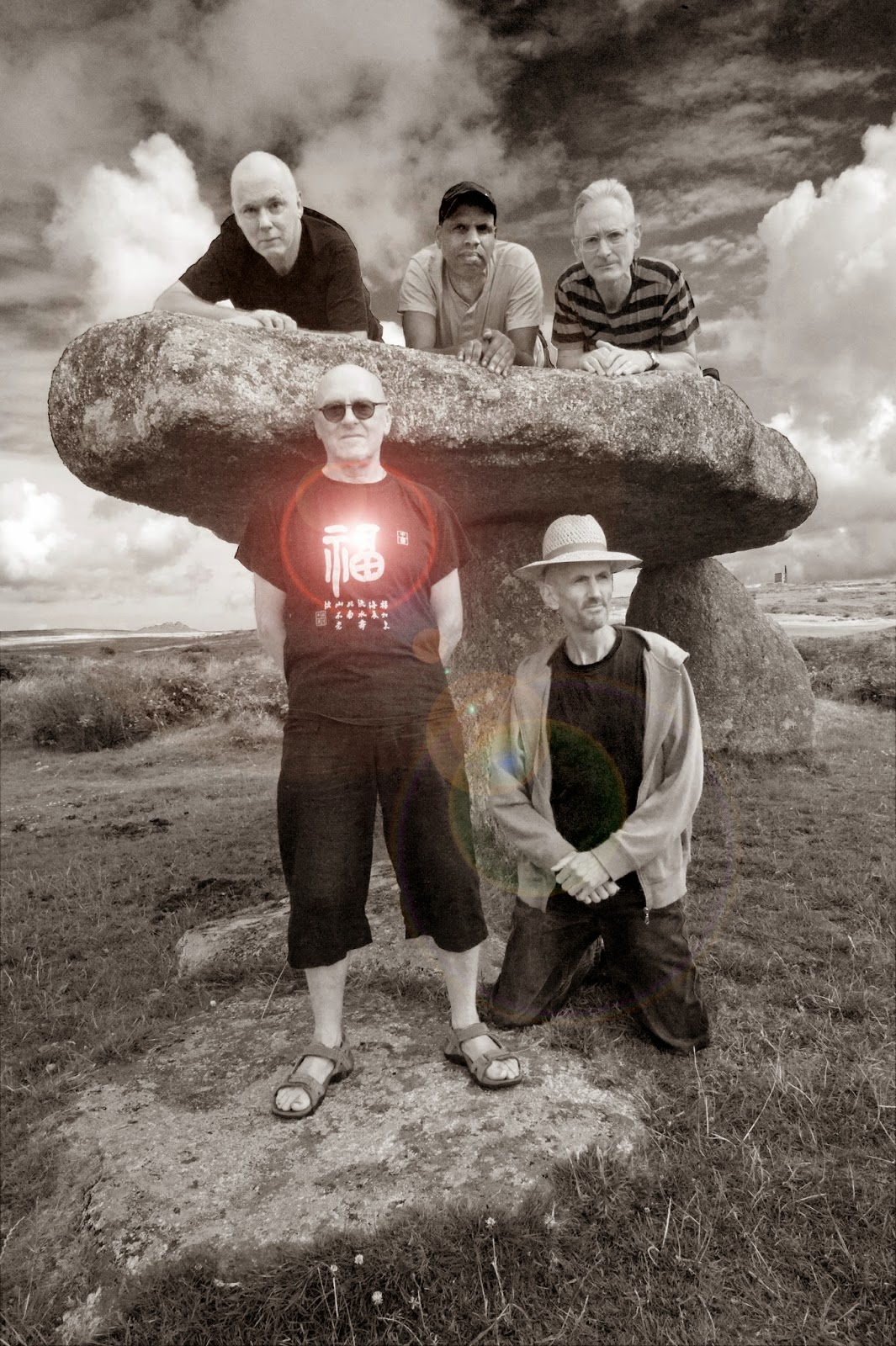
What can you tell us about your brand new compilation called ‘When Silence Was Sound 1977-80’?
Charlie Taylor: It contains almost all of the vinyl we released in the ‘70s plus a couple of live tracks recorded at the White Horse in Launceston before a typically wild audience. It’s mastered by Tony Poole and sounds better than the original vinyl!
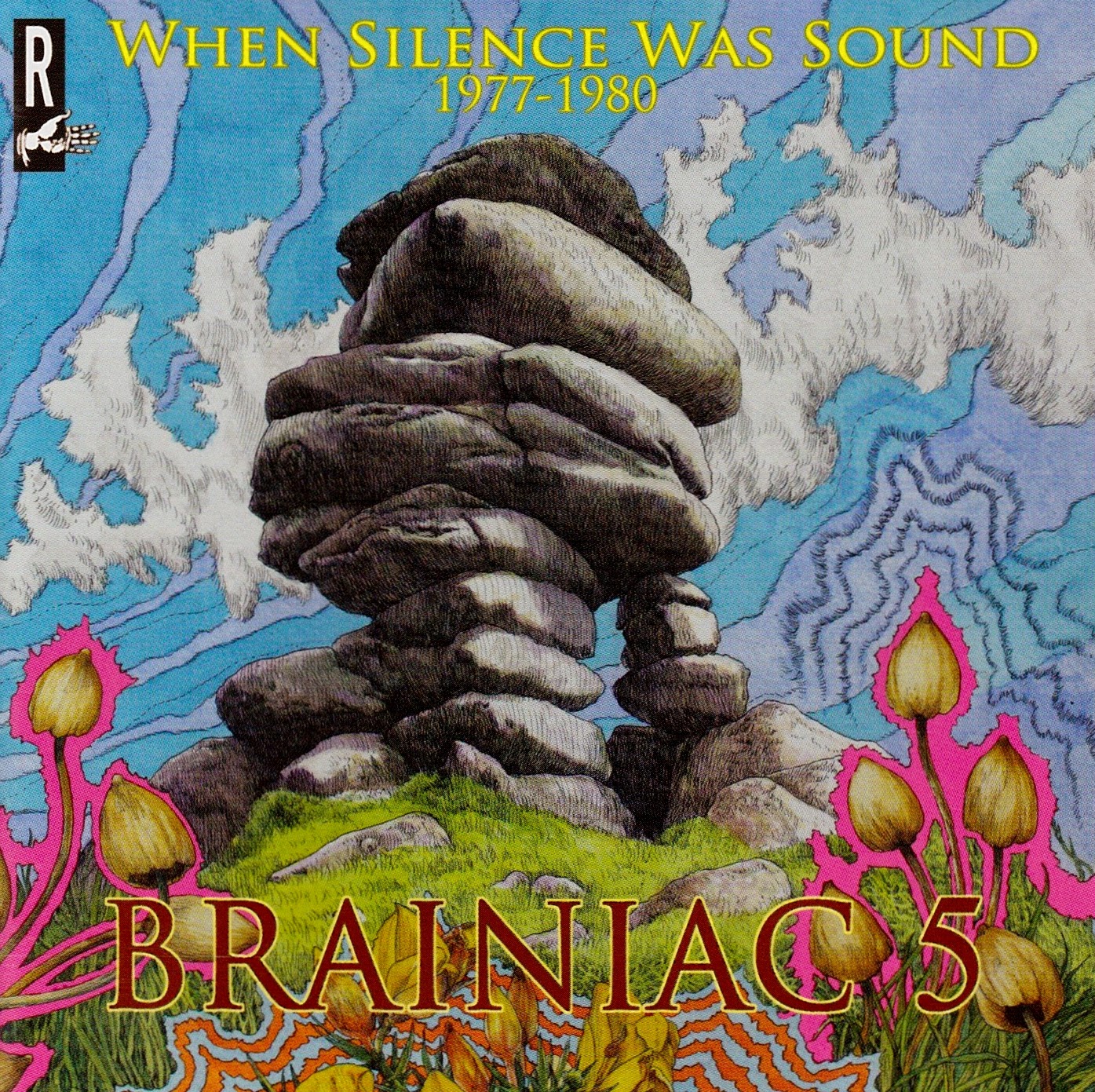
What are you currently up to and what are some of your future plans?
Charlie Taylor: Last year version three of the Brainiac 5 featuring Charlie Taylor (guitar/vocals), Woody (bass), Duncan Kerr (guitar/vocals), Steve Hudson (drums) released a 10” vinyl called Space Is The Place featuring a new recording of fan favorite ‘Space Is The Place’ plus a couple of weird Half Human Band songs.
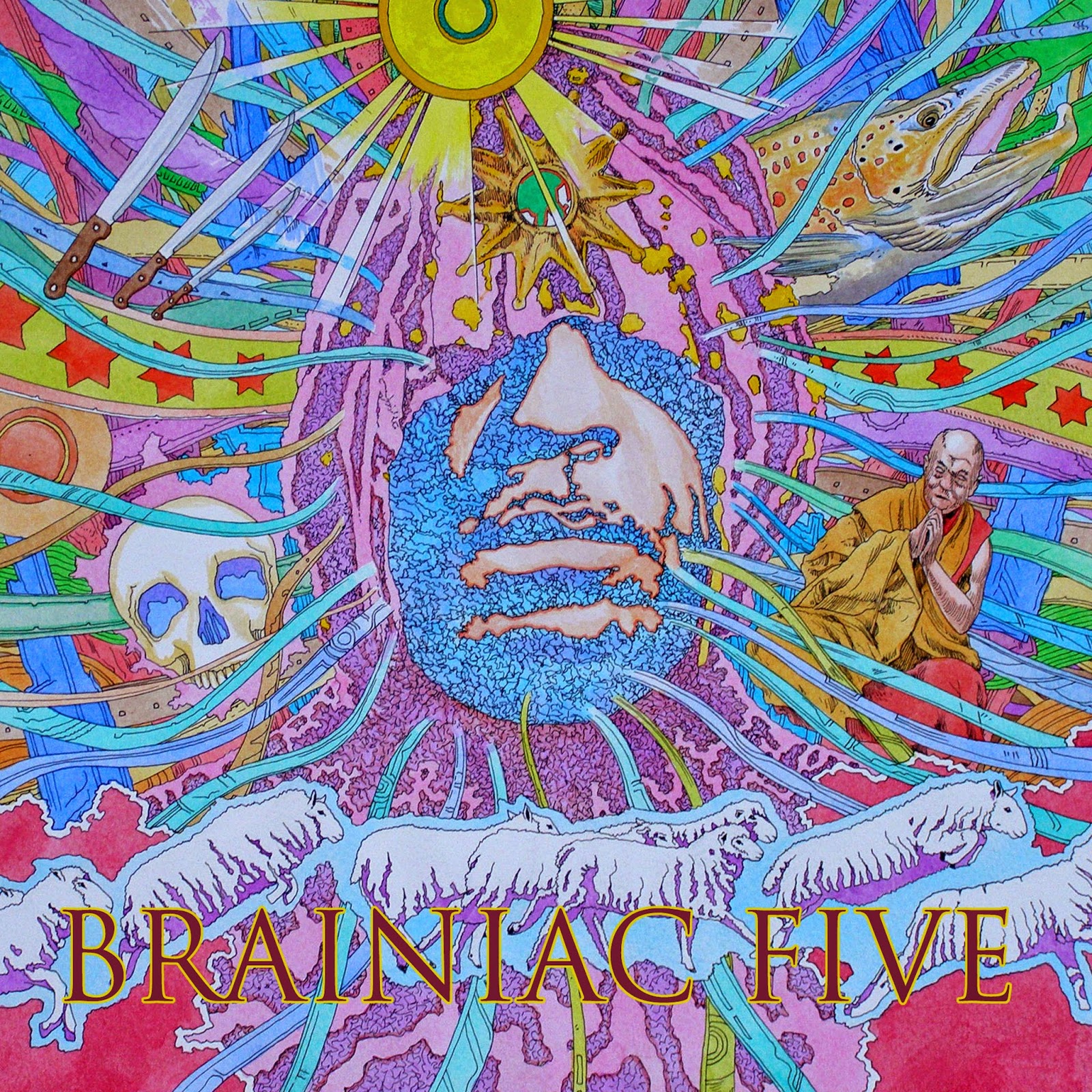
Positive reviews appeared in Shindig! (Kris Needs), The Wire (Byron Coley) and Holding Together. Duncan replaced Richard Wildman Booth, with whom he played in the legendary long lost Plummet Airlines. Steve left shortly after and was replaced by Nick Onley (sax/flute/vocals) and Wayne Worrell (drums/vocals). This year and last the Brainiacs have played a number of London shows, including The Doghouse, The Bull & Gate, Dublin Castle, The Betsey Trotwood, The Hideaway and The Silver Bullet, plus a couple of short Cornish tours taking in Launceston, Truro and Penzance. We’ve been recording again and have almost completed a new LP for autumn release, with a very different sound, more in the direction of Traffic and Family.
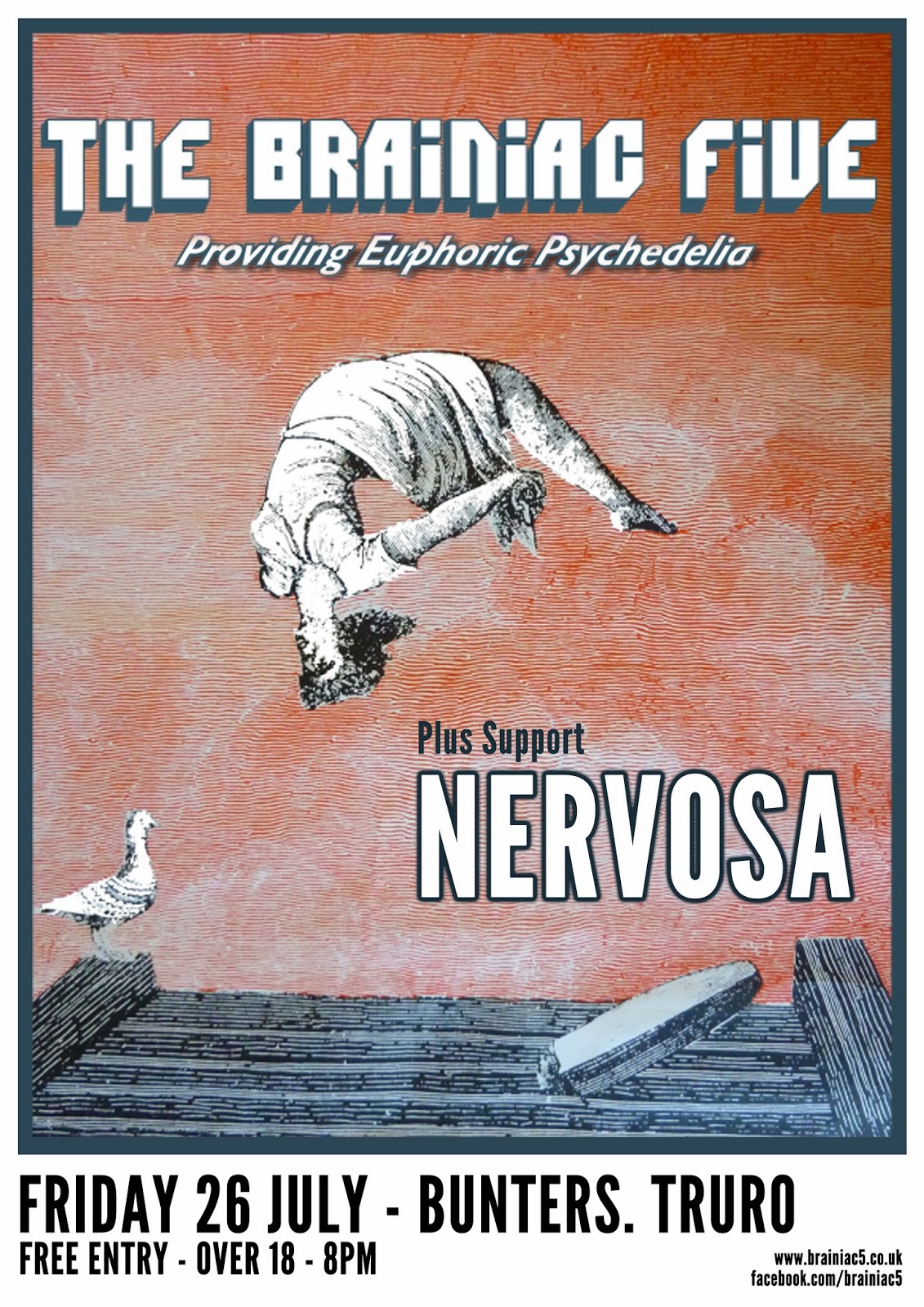
Richard Booth has just released, ‘Spill The Moon,’ a CD of new material with the aptly named Richard Booth Trio. It’s a semi-acoustic mix of atmospheric folk-rock, combining strong emotive songs with textured instrumentals and sparkling solos.
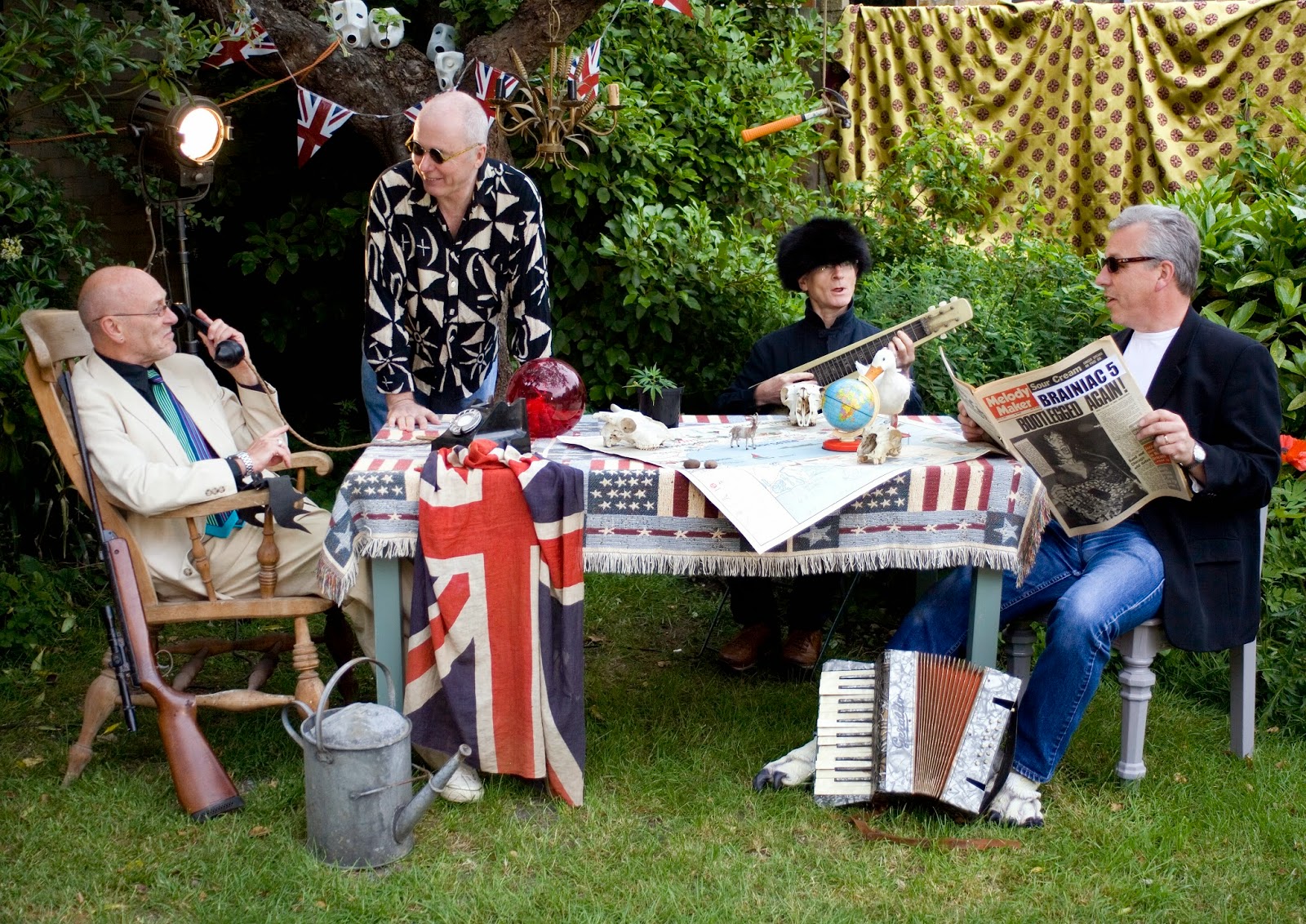
Thank you very much for taking your time. Would you like to share anything else with Psychedelic Baby readers?
Charlie Taylor: Thanks to Colin Hill for the use of parts of his essay from When Silence Was Sound, and to Psychedelic Baby for asking the questions.
Klemen Breznikar
Headline photo: Brainiac 5 MKI

